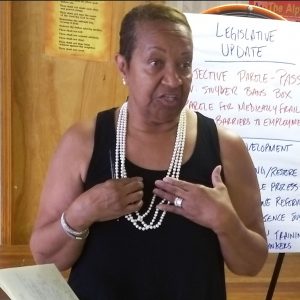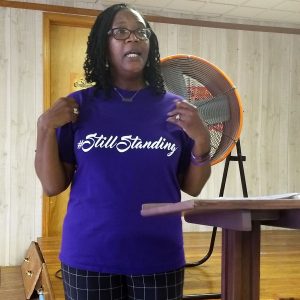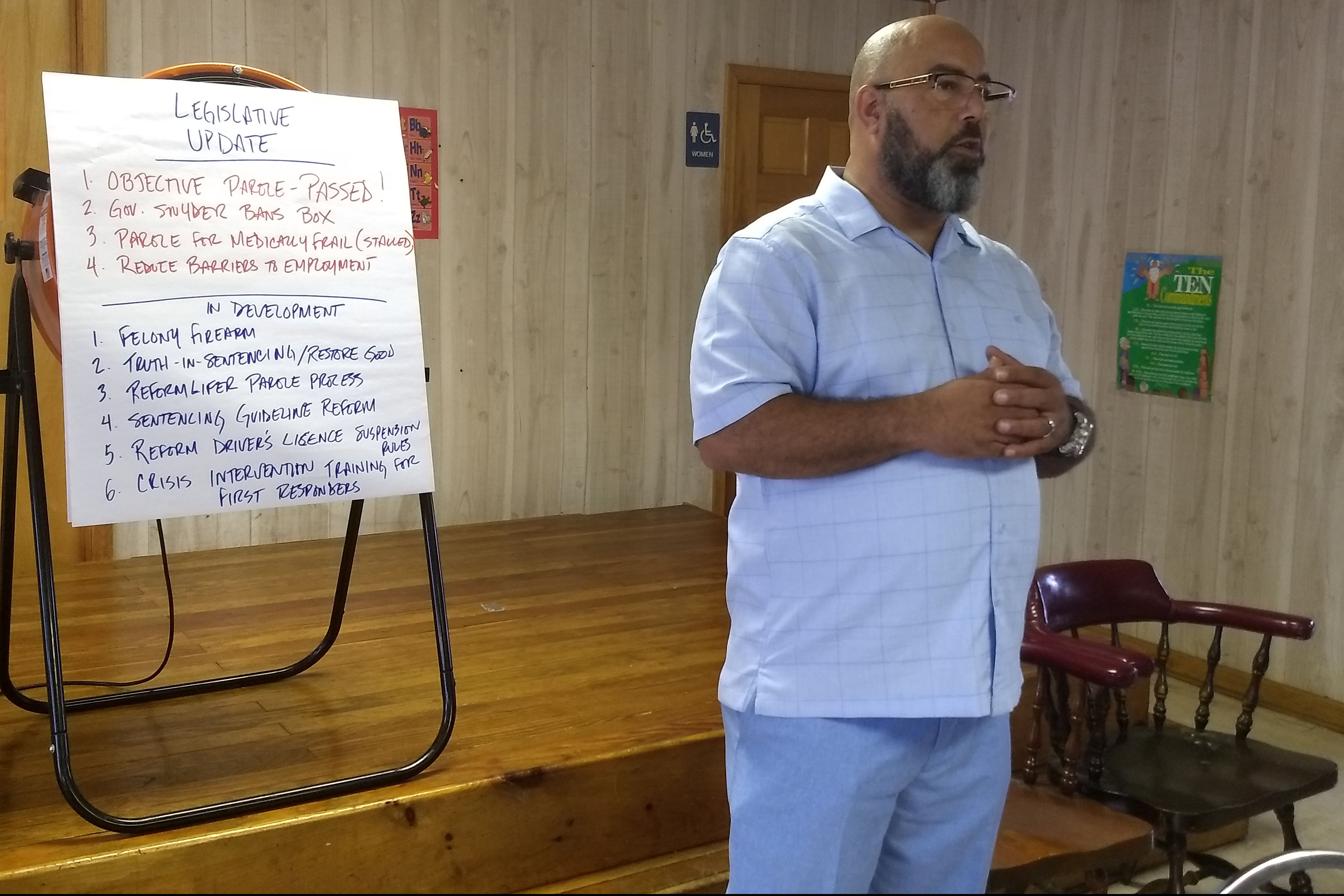September brought great legislative advancements to the cause of criminal justice reform in Michigan, such as the passage of objective parole, the governor’s decision to ban the box on state job applications and movement toward raising the age for 17-year-olds charged with crimes. Those topics were covered at the most recent Detroit Community Meeting held by Safe & Just Michigan in Detroit on Sept. 22, along with a series of heartfelt presentations from SJM members and partner organizations.
In convening the meeting, SJM’s Outreach Director Troy Rienstra gave an overview of recent legislative victories and a forecast of upcoming efforts, including an anticipated plan to introduce “Clean Slate” legislation in Michigan in the coming months. He also invited everyone in the room to Safe & Just Michigan’s Annual Membership Meeting and dinner, which is scheduled for Oct. 18 at the Radisson Hotel in Lansing.

Verna Hines addresses the meeting participants.
Verna Hines, a volunteer for SJM and long-time supporter of the organization, is coordinating a bus for people who live in the Detroit area who want to attend the annual meeting. For more information, please click here.
Verna, who has a brother in prison, told the gathering that when you have a loved one who is incarcerated, you’re locked up, too. The experience has made her a strong supporter of criminal justice reform, and in turn, a solid supporter of Safe & Just Michigan.
“I don’t support a lot of organizations, I only support and spend my money with organizations that I know have our interests at heart,” she said. “And no doubt about Citizens Alliance for Prisons and Public Spending, which is now Safe & Just Michigan, they do. They are no joke … Any positive change that happens in prison happens because of the clout that CAPPS, now Safe & Just Michigan, has done.”
She urged everyone in the room to get involved and to attend the annual meeting in Lansing. “We are the change agents,” she told them. “Get active so that we can all act together.”
Robert Olive, the coordinator of Detroit Nation Outside, urged people in the room to register to vote and to turn up at polling locations on Nov. 6. He reminded everyone that formerly incarcerated people and those on parole or probation have the right to vote in Michigan. In addition, people in jail awaiting trial or arraignment also have the right to vote.
“We all know our vote is our voice,” he said. “When you go vote on Nov. 6 and that elected official gets put in office, you’re not going to see the changes you expect to see overnight. … It comes back to us as the voters, and we have to hold them accountable. They work for us, the people.”
Shari Ware, SJM board member and executive director of Still Standing, an organization that helps both domestic violence survivors and people who perpetuated the harm heal and recover, offered an emotional closing to the two-hour meeting.
She shared her personal story, a harrowing journey that took her out of a violent marriage and led her to become a passionately concerned about the healing of both the survivors of domestic abuse and those who commit acts of domestic violence.
Ware told the gathering that she married young, and at first was grateful to have a husband who took such an interest in her. She didn’t immediately object to being told what she could and couldn’t wear, or that she couldn’t wear lipstick.
But the relationship turned violent. “Knives to the throat. Guns to the head,” she said. “I was strangled to point of passing out.”
When her husband threw their son against the wall, she realized she needed an exit plan.

Shari Ware shares her personal story.
She began hiding money under a tree bit by bit, and started gathering important identifying papers for herself and her children. And one night, when she heard a voice telling her to go, she grabbed her kids and left. There, at the front door, her sister was waiting for her. It turned out her sister had also heard a voice telling her to go pick up Shari.
Shari and her two children spent the next two years hiding in her sister’s basement while her husband looked for them. Shari said he promised to kill her if she ever left, and she believed him. It took two years for her to feel safe enough to emerge and seek a protection order.
She eventually fell in love again and moved to Detroit, where she founded Still Standing. She’s made it her mission to share her story and to bring healing to others who have been where she was — either as the survivor or the one committing violence.
“Today I come to bring some hope, because there is hope after being victimized, and most importantly there is healing,” she said.
She cautioned people not to judge others who have been in abusive situations who did not leave immediately.
“People would ask, ‘Why didn’t you leave”? If it was so bad why didn’t you go?’ But the question should be, ‘Why does he batter?’” she said. When we ask the victim, ‘Why didn’t you leave?’ you tell her it’s your fault. It’s her fault for staying, it’s her fault that he’s doing the things he’s doing. You’re saying there’s no accountability for the batterer.”
That’s wrong, Shari said.
Guiding the participants through a short exercise, she said the violence that plays out in homes is often rooted in unaddressed trauma experienced as children.
“We have to look at ourselves and acknowledge that we have hurt, that we have deep wounds. Normally, those take place between birth and the age of 18,” she said. “A lot of us are walking around as 55-year-olds, and we’re operating from a 7-yrear-old boy’s or girl’s perspective, because we have been wounded.”
But it’s not too late to heal, she said. She likened people to the Sankofa, a mythical bird that looks like a duck but whose head looks backward. The bird is often associated with the proverb, “It is not wrong to go back for that which you have forgotten,” which is said in the African country of Ghana. In America, it is used to represent the importance of learning from the past.
“It’s not just say that this thing happened, but to heal from them,” she said. “And there is healing available. All you have to do is grab hold of it.”
Safe & Just Michigan is grateful to all who attended and co-sponsors who sent presenters to our recent meeting in Detroit:
- American Friends Service Committee Michigan Criminal Justice Program Associate Demetrius Titus
- Michigan Faith in Action Executive Director and Safe & Just Michigan Board Member Eileen Hayes,
- Nation Outside Michigan Coordinator Kevin Harris,
- Nation Outside Detroit Coordinator Robert Olive
- Recovery Park Chief Impact Officer and Safe & Just Michigan Board Member Anna Kohn
- Safe & Just Michigan volunteers Elaine Flowers and Verna Hines
- State Appellate Defender’s Office Reentry Coordinator Elizabeth Stapleton
- Still Standing Executive Director and Safe & Just Michigan Board Member Shari Ware
We anticipate holding more community meetings in Detroit in the near future and hope to see you there. Stay posted for more information about where and when they will be held.

